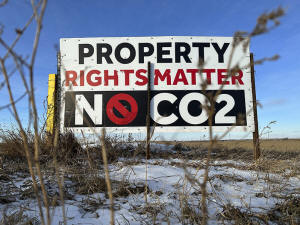Midwest carbon-capture pipeline could be delayed after eminent domain
ban in South Dakota
[March 13, 2025]
By SARAH RAZA and JACK DURA
SIOUX FALLS, S.D. (AP) — The company behind an $8.9 billion
carbon-capture pipeline proposed for five Midwestern states said
Wednesday it wants to indefinitely delay its plans after South Dakota
passed a law limiting its ability to acquire land for the project.
But even as it filed a motion to suspend its pipeline permit application
timeline with the South Dakota Public Utilities Commission, the
Iowa-based Summit Carbon Solutions said it remains committed to the
pipeline.
Summit attorney Brett Koenecke said the action was needed because the
legislation approved by South Dakota lawmakers and quickly signed into
law by the governor changed the company's ability to survey the route.
“The resulting delays in obtaining the surveys mean that the timelines
involved in Commission action on this application are unrealistic,”
Koenecke wrote in the motion. If the commission approves the motion,
they can set a new deadline for the permit application.
The proposed 2,500-mile pipeline would carry carbon emissions from
ethanol plants in Iowa, Minnesota, Nebraska, North Dakota and South
Dakota to be stored underground permanently in North Dakota. By lowering
carbon emissions from the plants, the pipeline would lower their carbon
intensity scores and make them more competitive in the renewable fuels
market.

The project had approvals in Iowa, Minnesota and North Dakota. But in
South Dakota, a new law banned the use of eminent domain — the
government seizure of private property with compensation — specifically
for carbon-capture projects.
The eminent domain bill sponsor Republican Rep. Karla Lems said Summit
is “trying to get their feet back under them” after the eminent domain
ban.
Summit's move was “generally good news” for Frank James, director of
advocacy group Dakota Rural Action, which opposed allowing eminent
domain for the project.
[to top of second column]
|

A sign reading "Property rights matter, no CO2" stands by a highway
near Strasburg, N.D., Thursday, Jan. 11, 2024. (AP Photo/Jack Dura,
File)

“It means the work that we did at the legislature with our allies
was impactful,” he said. “It clearly shows the citizens of South
Dakota really question these false solutions to climate change.”
Tad Hepner, vice president of strategy and innovation at the
Renewable Fuels Association, disagreed, saying stopping Summit in
South Dakota would put ethanol producers in the state at a
competitive disadvantage to out-of-state plants connected to the
pipeline.
“We don't want to see haves and have-nots,” he said. “We want as
many ethanol producers to be able to sequester their CO2 as
possible.”
North Dakota Gov. Kelly Armstrong said Tuesday he doesn’t know how
Summit will get its pipeline into North Dakota given South Dakota’s
eminent domain ban.
Armstrong said he is concerned because officials and industry
leaders were hopeful of eventually using carbon dioxide to extract
oil. North Dakota is the No. 3 oil-producing state in the country,
producing about 1.2 million barrels of oil per month.
Summit has already spent more than $1 billion on the project, Summit
spokesperson Sabrina Zenor said. Despite the South Dakota
suspension, “all options” are still on the table, the company said.
"Summit Carbon Solutions remains committed to working through this
process and advancing the project in states that support energy and
innovation," the company said in a statement.
___
Dura reported from Bismarck, North Dakota.
All contents © copyright 2025 Associated Press. All rights reserved |